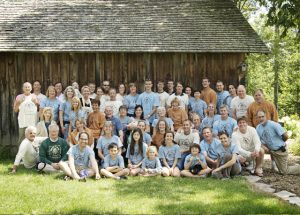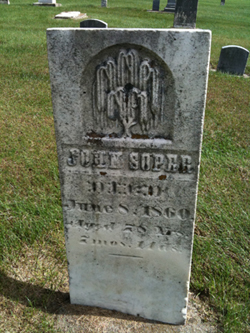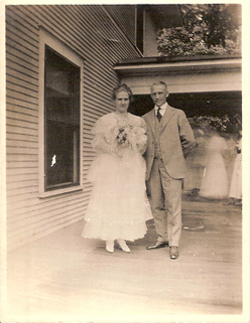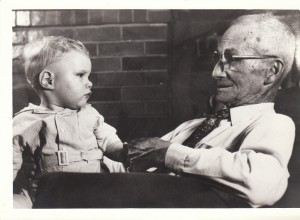Family, stakeholders, board members attend summer board meetings
Members of the Soper family, stakeholders and board members attend annual meetings in early August. 75 family members and four generations growing strong.
 |
 |
 |
 |
Being the last to carrying my father and grandfather’s name, I’ve pieced together some of our family and farm history. Enjoy. Emmet Harland (Harn) Soper III, August 2, 2017
Our Family Story
Our Soper family story starts with the beginning of this country. The struggle to oust the British was successful and a grateful Continental Congress had unlimited land on the frontier with which to reward Timothy Soper and the other soldiers for their service. In the early nineteenth century, the frontier had just begun to cross the Allegheny Mountains. Our forefathers were given a section (620 acres) of land in southeastern NY in Chenango County near the town of Pitcher Springs. Even today it is hilly terrain with lots of streams and dense forest undergrowth. But then it was cloaked in majestic native hardwoods and abounded with deer, turkey and ruffed grouse. The forests were cleared, stumps removed and farms began to dot the valleys and more fertile areas.
By the early 1840s, as pioneers continued their move west, stories filtered back to these New York farm settlements about the Iowa Territory which was about to become a state. The soil was black and rich even if you dug down six feet. The prairie grasses grew so tall that they hid a man on horseback and the prairie flowers were a riot of color. This was a marked contrast to the thin soil full of stones on which they were struggling.
In 1844 Timothy Soper, a descendant of revolutionary war Timothy Soper, came out to the Iowa Territory to scout it out. He then returned and convinced his brother, Jacob to head west. So, in 1846 Timothy lead the Soper party to Iowa, made up of his brother Jacob and Jacobs’s wife Selinda and their four children (Erastus, Roswell, Lilla and Chauncey … ages 4 months to six years). With the wagon packed with all their worldly possessions they headed for Iowa.
The Trek West
This small band of Sopers made the long trek across New York, the corner of Pennsylvania and along Lake Erie. My great grandfather, Erastus Burrows Soper (E.B. for short), was only six years old when his parents loaded him on that wagon. A trip he remembered well. To E.B.’s recollection, the family re provisioned in the big city of Chicago that had a population at the time of eight thousand. Then they crossed the Big Muddy from what is now Illinois into the eastern Iowa Territory.
 In the fall of that year E.B.’s father, Jacob, acquired 320 acres from the Dubuque Land Office and they settled in Jones County south of Martelle Iowa in a community known today as Fairview. That same year, December 28th, 1846 Iowa became the 29th state in the Union. The following year Timothy returned to New York and brought Jacob’s parents, Adah John, to Iowa. John and Adah had six sons and three daughters, most of whom came with their parents. The Sopers were on the move West.
In the fall of that year E.B.’s father, Jacob, acquired 320 acres from the Dubuque Land Office and they settled in Jones County south of Martelle Iowa in a community known today as Fairview. That same year, December 28th, 1846 Iowa became the 29th state in the Union. The following year Timothy returned to New York and brought Jacob’s parents, Adah John, to Iowa. John and Adah had six sons and three daughters, most of whom came with their parents. The Sopers were on the move West.
Jacob and Selinda settled in on their Iowa farmstead to raise their seven children. Life on the frontier was tough for all and Selinda died at age 36 of tuberculosis. Timothy, Jacob, Selinda and family are all buried in Norwich Cemetery near the town of Martelle Iowa where you can see their grave markers today.
E.B.’s mother, Selinda, came from a farm background and E.B. and his siblings would work in the yard and garden. Their mother permitted the children to keep and save all the cash returns from the sale of garden produce, fruit and berries they grew. E.B. grew up with the hard work of frontier farming and was educated at home by his determined mother. E.B. read everything he could get his hands on. At the age of fifteen at his mother’s insistence and his father’s dismay, they scraped together enough money and sent E. B. one county west to Linn County and Cornell College in Mt. Vernon, Iowa. From that time forward, Cornell became the college home for many Sopers.
E.B. wanted a college education but had to leave home just when he was old enough to really help on the farm. The Civil War interrupted his education as he joined the First Iowa Infantry as a private. In part, due to their heavy losses during the war, E.B. returned to Iowa, Commander, having aged well beyond his 21 years.
Going back to Cornell after the war he graduated with academic honors. In 1867 he married his college sweetheart, Elizabeth Cory. The newlyweds moved in with Elizabeth’s maternal uncle, Col. Smyth. It was in the Colonel’s law practice that E.B. learned the legal trade under the distinguished barrister. In pursuit of his own law practice, E.B. moved to Estherville Iowa at a time when there were no fences and travel was very difficult as it meant traversing the high ground around the sloughs that dotted the area.
After six years in Estherville, the railroad came through to Palo Alto County, one county south and he moved his office and family to Emmetsburg on April 15, 1879. The family was not wealthy but they were very comfortably fixed with holdings in farms and banks. After my Great Grandfather’s passing, my great grandmother gifted their family home in Emmetsburg to son Harland (my grandfather), farmland to her childless daughter, Ruby, and a large acreage to her other present and yet to be born grandchildren. This turned out to be a lawyer-smart move as the great depression came to Iowa in the early 1920’s. All the small banks failed and all of the assets my grandfather and his brother had inherited went in a vain attempt to see that depositors did not lose money. But because the grandchildren were underage, creditors could not take their farms.
My Grandfather and the Emmetsburg Years
My grandfather, Emmet Harland Soper Sr. (Bonpa to us grandchildren), was born on December 12, 1873 in Estherville Iowa. At age 6 he moved with his mother and father to Emmetsburg where he lived his whole life in this same house at 1605 East Seventh Street.
 Bopa was a bon vivant, carefree bachelor and the state tennis champion back when gentlemen lobbed the ball over the net with the hope that it would be returned. Although a graduate of Columbia University School of Law, he spent his entire life in farm management and in a love affair with the magnificent abundance of this land. At age 42, after pursuing my grandmother, Virginia Tunnicliff, for seven years while she sought a career in vocal music, he “finally yielded” (as the local Emmetsburg paper headlined). They were married and honeymooned at the Wisconsin Dells where you can still ride the same boat (at that time steam powered) down the same river that Jacob and Selinda were ferried into Iowa on.
Bopa was a bon vivant, carefree bachelor and the state tennis champion back when gentlemen lobbed the ball over the net with the hope that it would be returned. Although a graduate of Columbia University School of Law, he spent his entire life in farm management and in a love affair with the magnificent abundance of this land. At age 42, after pursuing my grandmother, Virginia Tunnicliff, for seven years while she sought a career in vocal music, he “finally yielded” (as the local Emmetsburg paper headlined). They were married and honeymooned at the Wisconsin Dells where you can still ride the same boat (at that time steam powered) down the same river that Jacob and Selinda were ferried into Iowa on.
They had a good life even with the thirteen-year difference in their age. Virginia had her brother Horace on a farm just across the pasture from their home place. She had her music, church friends, PEO, and sewing circle. His friends were the Scottish and English and Scandinavian people he grew up with. To quote my grandfather … “One thing was certain and that was there was no mixture with the people who lived South of the railroad tracks or with the strong Irish Catholic community. At the time, I felt that anyone with excessive hair on the back of the fingers was southern European and, therefore, of a lesser stature. As I look back, it is amazing how small and parochial one gets from living his entire existence in one small town”.
Their lives together were blessed with the birth of five children. Emmet Harland Jr. (my father and name sake), John, Hunter, Robert and little Virginia (she was the youngest). Unfortunately, John died at age two of an intussusception which is easily treated if correctly diagnosed.
The family loved music, story-telling, cribbage, and family time together on a regular basis with Uncle Horace and Aunt Margaret and by letter and occasional trips with Sara and Grace (my grandmother’s sisters) in the East.
The Depression Years
My grandparents went from abundance to want to bare bones poverty. After over ten years of scraping by on little income and what they could grow in the garden, grandfather developed a bleeding duodenal ulcer and was operated on at the Mayo Clinic for what, fortunately, turned out to be stress symptoms. Grandfather recalled sending my grandmother a check for $25 and telling her it was a third of what they had in the bank. According to my great grandmother’s will the farm land could not be touched until the youngest grandchild was twenty-one. It was late in the forties when this happened. My grandfather’s brother had seven children and they inherited most of the farmland as my grandparents only had four children. Small amounts of land came at the death of my grandfather’s sister, Ruby Alexander, but were dismayed to find that it was mortgaged to the hilt. It was in 1951 that our family inherited the Tunnicliff home place from the estate of Elizabeth Cory Soper and later in 1952 the Burr Oak and Swan Lake half sections.
By the time the land holdings were divided between my father and his brothers and sister, all of them were gone from Emmetsburg and married or embarked on careers. As told by my grandfather, a very wise decision was made that the home place really did not have any immediate worth, therefore, the house and all the farms were lumped together with four equal ownerships to my father, Emmet Harland Soper Jr. and his three siblings, Hunter, Robert (Bob) and Virginia (Dinny). The family was still faced with the problem of what the children should do with this inheritance. The most logical thing to do was to sell it all and divide up the loot and let each family go its own way. The big negative to this was that the land was bought at a pittance of its present value and the tax on such a sale would be very substantial.
Origins of Soper Farms
For some time, my grandfather toyed with the idea that perhaps, just perhaps, the land could be kept intact and in some manner, serve as a mechanism to keep all the children together as they pursue their far-flung careers. Fortunately, my father lived close enough to oversee this idea. He was aided and abetted by having nephew Jack Tunnicliff (my first cousin once removed) with the farming smarts to be an able and knowledgeable hands on advisor.
Grandfather knew that several of his children and spouses were struggling along on a very minimal income. It would have been natural for some to wonder at times about why some of the land could not be sold and a bit of the money passed along. To my grandfather’s delight, his children chose not to, deciding to retain their ties to the land. As Grandfather said many times, “I feel this is a continuum of the generational relationship of Sopers to the land. I am heartened by your commitment. If you continue on this course you may have a pearl of great value for my grandchildren to enjoy”.
And so it is today. Our family has 75 plus living members spanning four generations with a few buns in the oven I’m not aware of. After my father managed the farms for 30 years, my cousins Ginger and Jim took turns as President. In 2007 the family asked me to take my turn at the reins and we are now in the midst of converting our last conventional farm to organic. It has been a journey through many organic models including vegetables, pastured chickens, grass-fed cattle and a farm store/cafe. We have now settled on growing organic oats, alfalfa, corn, and soybeans because it is much easier to store grains than a tomato and caring for livestock.
In many respects our move back to sustainable farming is in line with the values Bonpa had and his reverence for our Iowa land. Shortly before his death he instructed the pastor who lived in the parsonage across the street to plant four more rows of peas in the family garden that spring. And so it is today that from these deep roots in Iowa and Emmetsburg spring new shoots. And, as grandfather would end all the bedtime stories to his grandchildren sitting at his feet … “and they lived in peace, died in Greece and were buried in an eggshell.”
Bedtime stories and A Frontier Childhood Memory
 In February of 1954 my grandfather wrote about his memories as a child of six, moving from Estherville to Emmetsburg. The date was April 1878. These adventures were the foundation for many bedtime stories Bonpa would tell us grandchildren.
In February of 1954 my grandfather wrote about his memories as a child of six, moving from Estherville to Emmetsburg. The date was April 1878. These adventures were the foundation for many bedtime stories Bonpa would tell us grandchildren.
In his own words: “A flurry of excitement stirred the pioneer Soper family in Estherville on April 15th, 1879 that being the day of the long established overland journey to Emmetsburg, the then railhead of the Chicago, Milwaukee & St. Paul railroad which had reached that point in August, 1878.
The Soper are rooted in the early history of Emmetsburg, Iowa when Grandfather moved on December 12 1873 from Estherville, Iowa to Emmetsburg with his parents and siblings. In Bonpa’s words “… we moved to Emmetsburg where I lived my whole life in this same house at 1605 East Seventh Street.”
Since this beginning the family now spans 4 generations, over 75 family stockholders and 17 family board members with the only intention to keep the farms and to gather together every year to celebrate family and our farms.
Over these years we have migrated from being passive stewards of our farms contracting with neighbors who farmed our ground and shared the harvest to active stewards as we engage directly in the business of sustainable organic farming. After trying just about everything we could think of in organic farming we have settled on organic row crops. To this day our farms grow organic corn, oats, soybeans, alfalfa … and who knows what may be next. It is all in the faith and conviction that it is our responsibility as stewards of this precious land to keep it healthy, safe and alive.
August 8, 2017 – Harn Soper
Several months ago, while driving back from a weekend in Moab rafting on the Grand and climbing the surrounding cliffs looking for petroglyphs, Sylvi began quizzing me on the Soper Family history … curious as to what she was getting herself into. I mentioned Captain E.B. Soper, Bonpa’s father (to those whose memories go that far back). With fast thumbs on her phone Sylvi found an address on line that EB made to the 50th anniversary of Cornell College. I sent this to the first Cornelian I could think of, Doug, and he dated this reunion around 1903. It is fascinating. Read on …